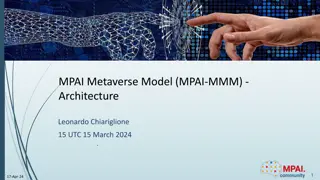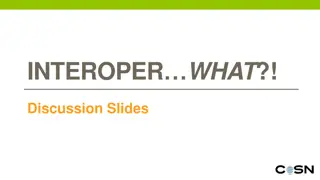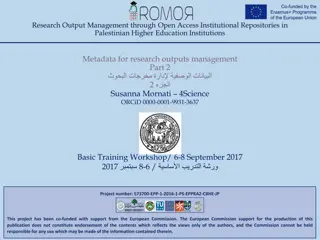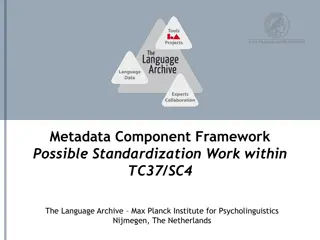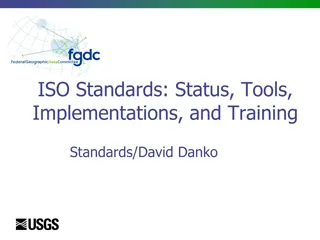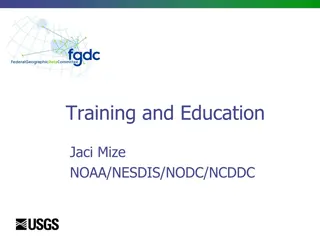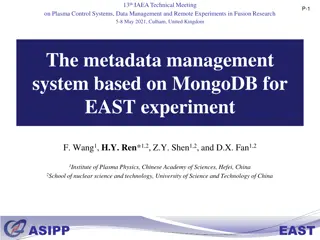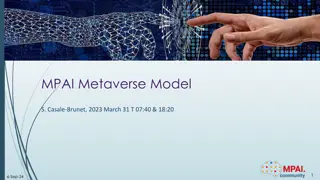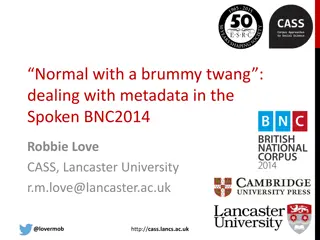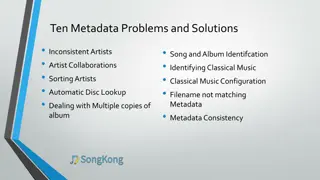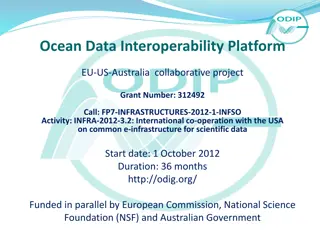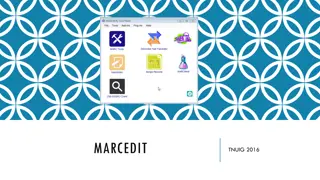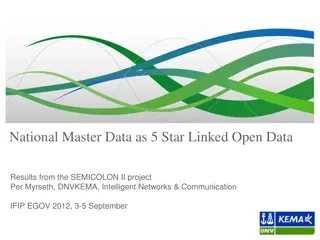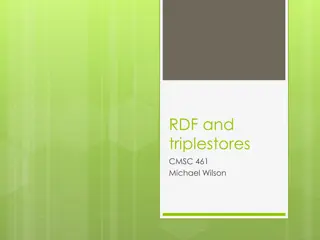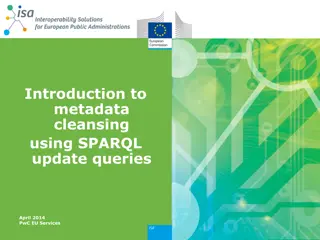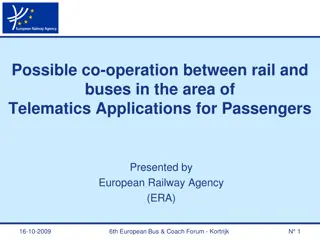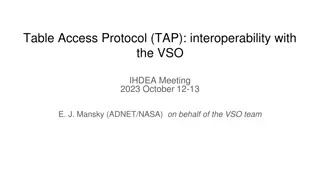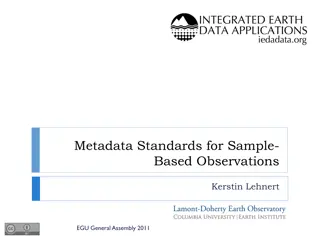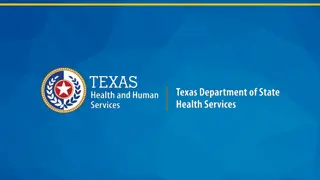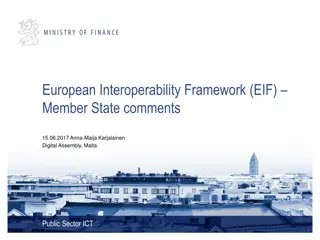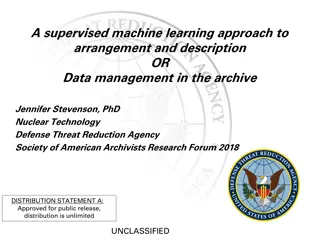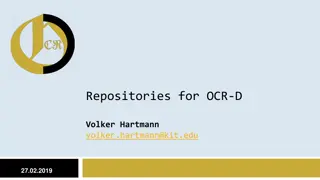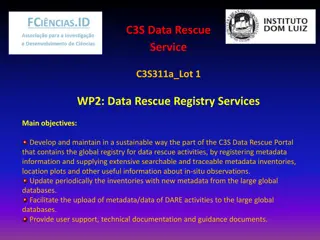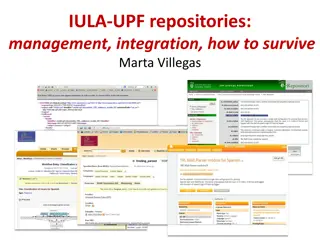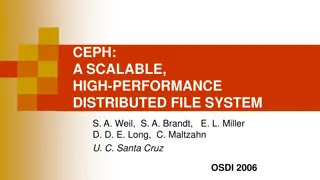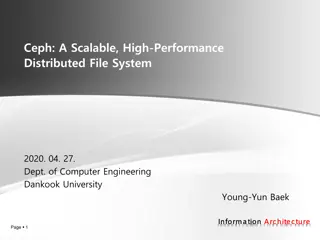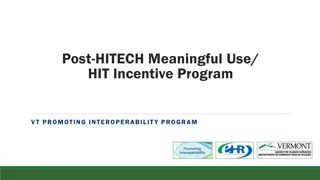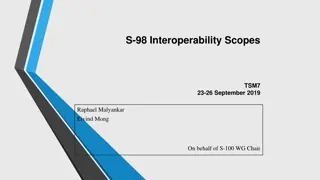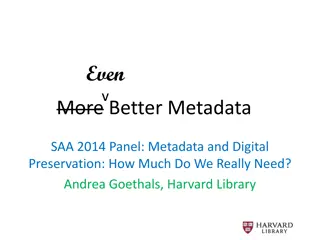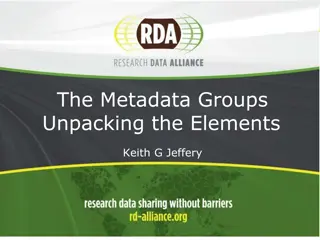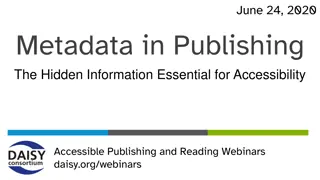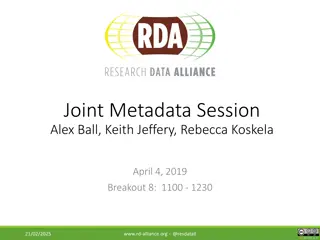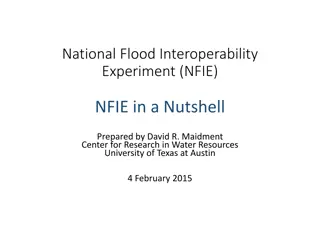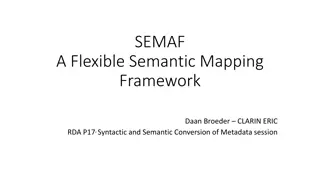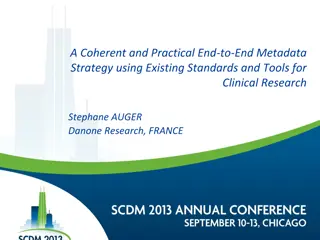MPAI's Role in Metaverse Interoperability
MPAI, spearheaded by Leonardo Chiariglione, plays a crucial role in defining standards and technologies for the metaverse, ensuring interoperability between different metaverse instances. This involves functional and prescriptive interoperability, enabling seamless data exchange and operation models
3 views • 38 slides
Enhancing Wheat Data Interoperability for Sustainable Production
The wheat research community faces challenges in meeting the increasing demand for wheat production due to a lack of data harmonization and standards. The Wheat Data Interoperability Working Group aims to improve the interoperability of wheat-related data through shared guidelines, tools, and recomm
4 views • 10 slides
The Impact of Interoperability in Education
Explore the significance of interoperability in education through insightful statistics and data. Learn how improved interoperability can benefit CTOs, teachers, and schools. Discover the challenges and potential solutions related to the seamless sharing of data and digital tools in educational sett
0 views • 30 slides
Research Output Management in Higher Education: Metadata and FAIR Principles
Research in higher education focuses on metadata and FAIR principles for effective research output management. The content discusses the challenges related to metadata standardization and the importance of data findability, accessibility, interoperability, and reusability in scientific data manageme
0 views • 22 slides
Standardization Process for Metadata Components in Language Archives
The standardization process for metadata components within TC37/SC4 at the Language Archive Max Planck Institute involves analyzing existing metadata sets, seeking input from the CLARIN EU community, and determining the next steps for standardization. The process includes forming submission groups,
0 views • 23 slides
Comparison of Metadata Standards: FGDC, ISO, and NAP
Explore the differences and commonalities between the Federal Geographic Data Committee (FGDC), International Organization for Standardization (ISO), and North American Profile (NAP) metadata standards. Discover the evolution, mandatory elements, code lists, and focus areas in these standards to bet
0 views • 14 slides
Comprehensive Training and Education Resources for Metadata Standards
Explore a wealth of training resources including workshops, guidance documents, ISO workbooks, and online lessons related to metadata standards. Access tools, best practices, and guidance for transitioning to international metadata standards like ISO. Learn from presentations, modules, and other tra
0 views • 9 slides
Metadata Management System for Fusion Research Experiment Data
The metadata management system based on MongoDB for the EAST experiment addresses the challenges posed by the increasing size and complexity of experimental data. With a focus on resource organization and user accessibility, this system streamlines data management, enabling quick insights into the v
0 views • 15 slides
The Road to Metaverse Interoperability: Challenges and Solutions
Metaverse standards and interoperability are crucial for unleashing the full potential of this transformative technology. However, the lack of common agreement on what a metaverse entails poses challenges. The MPAI roadmap addresses key steps towards achieving interoperability, including developing
0 views • 17 slides
OpenFMB Framework: Empowering Utility Interoperability
Open Field Message Bus (OpenFMB) is a framework and reference architecture designed to enable interoperability for Distributed Intelligence Applications, focusing on cybersecurity, microgrids, Distributed Energy Resources (DER), and more. It provides a standard API for Electric Grid interoperability
0 views • 16 slides
Standard Metadata, Counters, and Meters in P4 Programmable Data Planes
Learn about the role of metadata in packet processing, the significance of intrinsic metadata, and how to utilize custom headers for monitoring switch queues in P4 programmable data planes. This tutorial explores the V1 Model standard metadata and provides hands-on experience in defining and using c
0 views • 21 slides
Dealing with Metadata in the Spoken BNC2014: An Insightful Study
Delving into the metadata of the Spoken BNC2014, this study by Robbie Love at Lancaster University focuses on regional categorization, socio-economic status, and advancements towards dual compatibility with the BNC1994. With over 800 hours of recordings and nearly 700 unique speakers contributing to
0 views • 39 slides
Metadata Challenges and Solutions in Music Management
Addressing ten metadata issues in music organization, such as inconsistent artist attributions and sorting discrepancies, with corresponding solutions including entity-based approaches and artist collaboration management. Strategies for improving metadata consistency and optimizing music data retrie
0 views • 30 slides
Ocean Data Interoperability Platform: EU-US-Australia Collaborative Project
This collaborative project, funded by the European Commission, National Science Foundation (NSF), and Australian Government, aims to develop a collaboration platform for organized dialogue between partners from Europe, the USA, and Australia. The project focuses on establishing a coordination platfo
0 views • 9 slides
MarcEdit - Comprehensive Metadata Management Tool
MarcEdit is a versatile metadata management tool created by Terry Reese in 1999. Originally designed for MARC records, it has evolved to support various types of data. Key features include MARC editing tools, RDA helper, regular expressions support, task management, and more. Its robust functionalit
0 views • 16 slides
Improving Interoperability with Linked Open Data in the SEMICOLON II Project
The SEMICOLON II project aimed to enhance eGov solutions by utilizing Linked Open Data principles to open up public registers and create semantic technologies. The project spanned from 2007 to 2013 with a budget of approximately $15 million, focusing on core national master data maintenance and moti
0 views • 25 slides
Metadata and RDF in Data Management
Explore the significance of metadata in data management, the use of RDF and triple stores in organizing data, different reasoning methods available, and the importance of metadata structures. Learn how schemas in RDF allow for easy integration of diverse data types without requiring database reorgan
0 views • 18 slides
Metadata Cleansing Using SPARQL Update Queries
Learn how to transform and cleanse RDF metadata using SPARQL Update queries to conform to the ADMS-AP for Joinup. This tutorial provides essential knowledge on converting metadata for interoperability solutions and the main queries involved. Discover how to ensure your metadata is compliant and read
0 views • 37 slides
European Railway Agency's Role in Promoting Cooperation between Rail and Buses in Telematics Applications
The European Railway Agency (ERA) plays a crucial role in enhancing cooperation between rail and buses through Telematics Applications. Established in 2004, ERA focuses on recommending legislation, ensuring interoperability, and enhancing safety in the European rail network. Recommendations made by
0 views • 17 slides
Integration of REST/TAP Services into VSO Metadata DB Table
Current status of REST/TAP code implementation in the VSO along with the integration details of REST/TAP services into the VSO metadata DB table. The post discusses the interoperability with VSO IHDEA meeting, production status, available services, and the Apache session ID for distinguishing querie
0 views • 12 slides
Metadata Standards for Sample-Based Observations
Exploring the importance of metadata standards for sample-based observations, this comprehensive guide covers various aspects such as soil sampling, legacy repositories, policies, and best practices. Learn about the role of metadata in discovering, accessing, and preserving samples for long-term sha
0 views • 28 slides
Update on Health Information Technology & Policy Committee Insights
The update on health information technology covers recent developments in federal actions related to healthcare reimbursement rates and interoperability rules. Changes in the Medicare Inpatient Prospective Payment System and Hospital Promoting Interoperability Rule impact hospitals, requiring partic
0 views • 12 slides
European Interoperability Framework (EIF) Member State Comments by Anna-Maija Karjalainen
Anna-Maija Karjalainen, Director General of Public Sector ICT in Finland, shares insights on the European Interoperability Framework (EIF) and Finland's progress towards interoperable digital services. The EIF aims to enhance the delivery of public services across Europe, promoting open data, semant
0 views • 5 slides
Supervised Machine Learning for Data Management in Archives
In this study by Jennifer Stevenson, a supervised machine learning approach is proposed for arrangement and description in archives, specifically focusing on the DTRIAC collection which contains a vast amount of historical documents related to nuclear technology. The aim is to expedite the catalogin
1 views • 15 slides
Managing Research Data Repositories for OCR-D
Research data repositories play a crucial role in the OCR-D framework, storing and managing data from document analysis processes. These repositories, like the Ground Truth (GT) repository, support FAIR principles by organizing findable, accessible, and retrievable data with metadata and provenance
0 views • 11 slides
Sustainable Development of C3S Data Rescue Portal
Develop and maintain the C3S Data Rescue Portal with a global registry for data rescue activities, focusing on registering metadata, providing searchable inventories, and supporting DARE activities. The project aims to update inventories, facilitate data uploads, and offer user support and technical
0 views • 20 slides
Challenges in Integrating Different Repositories for Metadata Interoperability
Addressing the integration of repositories with varying schemas and protocols such as OAI-PMH and APIs is crucial for ensuring metadata interoperability. The key requirements include maintaining data integrity through a centralized editing point, leveraging automatic import/export mechanisms, and ad
0 views • 8 slides
Overview of Ceph Distributed File System
Ceph is a scalable, high-performance distributed file system designed for excellent performance, reliability, and scalability in very large systems. It employs innovative strategies like distributed dynamic metadata management, pseudo-random data distribution, and decoupling data and metadata tasks
0 views • 42 slides
Overview of Ceph: A Scalable Distributed File System
Ceph is a high-performance distributed file system known for its excellent performance, reliability, and scalability. It decouples metadata and data operations, leverages OSD intelligence for complexity distribution, and utilizes adaptive metadata cluster architecture. Ceph ensures the separation of
0 views • 23 slides
Vermont Promoting Interoperability Program Overview
The Vermont Promoting Interoperability Program, formerly known as the Electronic Health Record Incentive Payment program, incentivizes Medicaid providers to adopt, implement, and meaningfully use electronic health records. This program, funded mostly by federal dollars, aims to improve interoperabil
0 views • 16 slides
S-98 Interoperability Scopes Overview
This paper discusses options for defining interoperability scopes, restructuring the draft S-98 interoperability specification, and assessing the implications of implementing different levels of interoperability. It suggests a phased introduction with pauses for evaluation, focusing on lower complex
0 views • 8 slides
JACIE ECCOE Workshop on ARD Interoperability Breakout Session Summary
JACIE ECCOE workshop held a breakout session on ARD interoperability covering topics such as calibration, data quality, accuracy, traceable uncertainty, geospatial workflows, governance, and leadership. Various experts led the breakout groups to discuss key questions and actions for improving data q
0 views • 7 slides
Evaluating Metadata Quality for Digital Preservation at Harvard Library
Explore the importance of metadata quality in digital preservation with insights from Harvard Library's experience managing their Digital Repository Service. Discover challenges faced with user-contributed metadata and the necessity for systematic validation and tracking to ensure accurate preservat
0 views • 17 slides
The Metadata Groups Unpacking the Elements
Metadata plays a crucial role in describing and contextualizing data for users, software, and computing resources. It goes beyond mere data description and discovery to facilitate the coupling of various resources, including a Virtual Research Environment. The FAIR principles emphasize the importanc
0 views • 26 slides
Metadata in Publishing
This content delves into the crucial role of metadata in publishing for enhancing accessibility. Experts discuss accessibility metadata in EPUB, ONIX, library formats, and more, aiming to improve inclusivity and usability of publications. Learn about different types of EPUBs, discoverable vs. access
0 views • 31 slides
Joint Metadata Session Update and Perspectives
In this session, there are updates on Metadata Standards Catalog Working Group, Metadata Element Set, and valuable perspectives from various groups regarding metadata standards and data stewardship. The agenda covers discussions on research data management, vocabulary methods, and the future of data
0 views • 14 slides
National Flood Interoperability Experiment: NFIE in a Nutshell
This document provides an overview of the National Flood Interoperability Experiment (NFIE) prepared by David R. Maidment from the Center for Research in Water Resources at the University of Texas at Austin on February 4, 2015. The NFIE aims to enhance interoperability in flood-related data and syst
0 views • 13 slides
Flexible Semantic Mapping Framework for Improved Semantic Interoperability
This framework Proposal aims to enhance semantic interoperability by introducing a pragmatic and flexible approach to semantic mapping. It addresses current fragmented practices, offering tools for end-users to create, reuse, and extend mappings. With a focus on FAIR principles, the framework also e
0 views • 6 slides
Practical Metadata Strategy for Clinical Research
Implementing a cohesive metadata strategy using existing standards like CDISC SDTM and tools to improve control and efficiency in managing clinical study data and metadata. The strategy involves creating a Study Metadata Modeler, standardizing metadata, and utilizing tools for better management and
0 views • 20 slides
Project Mission and Objectives
Phase II of the project involves supporting the adoption of ISO 19115-2 as a standard for data metadata, aimed at making it easier for organizations to become ISO compliant. The project objectives include eliminating the need to learn ISO 19115 standards, integrating ISO support into local applicati
0 views • 12 slides
